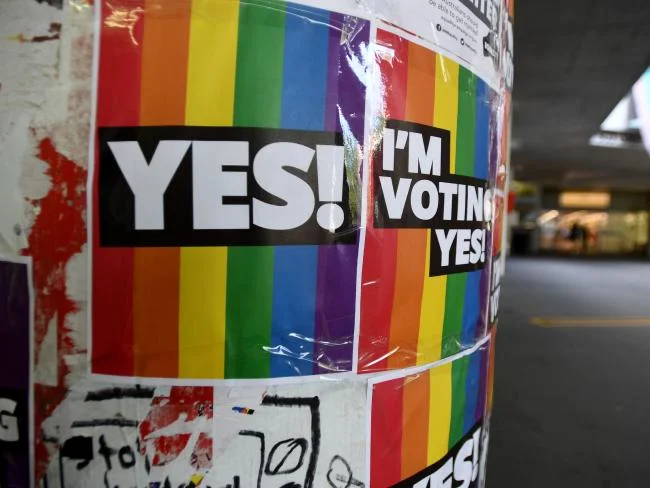In today’s post, Laura Vidal, who recently joined Good Shepherd Australia New Zealand, discusses best practice solutions to early and forced marriage, particularly in light of recent Australia policy changes. Due to her work in both service delivery and policy responses to individuals who have experienced human trafficking and slavery, Laura received a 2017 Winston Churchill Memorial Trust Fellowship, which took her on a study tour to 6 countries (Sri Lanka, United Kingdom, Denmark, United States, Canada and Kenya) to inform responses to early and forced marriage.
Read MoreThe ‘gender pay gap’ is a major contributor to conditions that enable and perpetuate domestic and family violence. That women on average earn much less than men increases their vulnerability to financial abuse, makes it difficult for them to leave violent relationships, and leaves them much worse off financially if they do leave. Recent research suggests that it’s the ‘child penalty’ more than anything else that is currently driving the pay gap. ANZSOG Research Fellow Sophie Yates (@MsSophieRae), who is completing a PhD on gender and domestic and family violence, reflects on the importance of changing our expectations about who will take care of children if we want to significantly reduce family violence.
Read MoreIn the new age of big data, firms are gathering comprehensive information about consumers - transaction and consumption data, browsing history, social network, or location data - that is increasingly tipping the scales in the firms' favour. In this post, Lauren Solomon, Chief Executive Officer of the Consumer Policy Research Centre, reflects on the need to broaden our understanding of consumer data issues in Australia, beyond establishing a Consumer Data Right and the Review into Open Banking. This piece was originally published in The Mandarin.
Read MoreThe role of government policy is to support its citizenry to thrive. By this measure, Australian policy is failing Aboriginal and Torres Strait Islander communities, and women are bearing the brunt of failed policy through seriously compromised health and wellbeing. In today’s analysis, Vanessa Lee from the University of Sydney applies a lens of political determinants of health to illuminate policy failure for Indigenous women and their communities, and calls for the government to be held accountable to the outcomes of generations of harmful policy. This piece is drawn from an article that ran in the Journal of Public Health Policy in 2017.
Read MoreIn the US, nine states and the District of Columbia now allow recreational marijuana usage and 30 states allow medical use. Despite a very unfriendly Trump Administration, more states are lining up to join the legalisation wave.
Read MoreCharities have long played a role in supporting and advocating for people when markets and governments fail. They have existed in Australian history since well before the welfare state and have continued to fill gaps either on behalf of government (with funding being directed from government to the third sector) or instead of government (with funding via other sources, such as philanthropy).It’s important for a stronger, equitable society that charities are able to continue to advocate for their “charitable purpose”.
Read MoreIn 1991 Carol Bacchi comprehensively introduced poststructuralism and social constructionism to policy studies with her book Women, Policy and Politics: The Construction of Policy Problems. It detailed an approach called ‘What’s the problem represented to be?’ and offers a different way of conceptualizing and understanding policy. Whilst usual approaches tend to treat policy as axiomatic or self-evident, Bacchi’s challenges the privileging of all forms of expertise and knowledge. For Bacchi, approaches to policy studies are ‘inherently political’ and need to be treated as such.
Read MoreKym Peake is secretary of the Victorian Department of Health and Human Services. She previously held senior executive roles in the Victorian Department of Premier and Cabinet, Department of Education and Early Childhood Development, and the Department of Prime Minister and Cabinet. This article is the text of a speech she gave on the ethical challenge of family violence, edited only for clarity by The Mandarin.
Read MoreIn a recent episode of Professor Glyn Davis’ podcast The Policy Shop, Bruce Bonyhady (former Chair of the National Disability Insurance Agency) and PtP Policy Whispere A/Prof Helen Dickinson discussed how the National Disability Insurance Scheme came to be, the scheme’s ongoing rollout, and whether the NDIS will in fact improve the livelihood of people living with disabilities in Australia.
Read MoreAn ANZSOG-funded research project is exploring the increasing use of robots in care services to replace or complement the roles of humans. In this article, researchers Helen Dickinson, Nicole Carey, Catherine Smith and Gemma Carey explore some of the long-term implications for governments from the rise of robots.
Read MoreIn our first post of 2018 (by The Mandarin's David Donaldson and featuring ANZSOG research by Ellie Malbon and Gemma Carey), we look at two images of workplace flexibility - is it geared around benefits for the organisation, or for the individual? And what are the implications for employee health?
Read MoreIn our last policy analysis of 2017, Renata Anderson of Women’s Health Victoria provides us with an overview of how gendered disadvantage negatively impacts on women’s relationship to food. Policy which fails to address these issues are negatively impacting on women’s health.
Read MoreOver the past twelve months we have featured a number of blogs from Good Shepherd researcher Juanita McLaren (@defrostedlady) regarding the poor design and outcomes of the Federal Welfare to Work policy. With an aging population, much of Australia’s welfare policy is aimed at replacing this demographic in the workforce. This is addressed largely by targeting groups with lower employment numbers, particularly single parents, 85% of whom are female. In this blog, Juanita provides a snapshot of what JobActive employment opportunities are currently available in Shepparton and its surrounds, and assesses their suitability for single mothers.
Read MoreOn 2 September, the Women’s Policy Action Tank presented Putting Women at the Centre: A Policy Forum. We were delighted to have Celeste Liddle (@Utopiana), public commentator, blogger (Rantings of an Aboriginal Feminist), Arrernte woman, Unionist, and recent inductee onto the Victorian Honour Roll of Women as one of our keynote speakers. Here we present part 2 of her talk, in which she traces low numbers of Aboriginal students at the tertiary level with systemic injustices that Aboriginal and Torres Strait Islander communities experience. Specifically, Celeste discusses how lack of facilities and sanitary supplies keep young women from attending school, and the historic and current practice of non-payment to Aboriginal and Torres Strait Islanders for their work – which continues today in the guise of the government’s mis-named Community Development Program. Part 1 can be found here.
Read MoreOn 2 September, the Women’s Policy Action Tank presented Putting Women at the Centre: A Policy Forum. We were delighted to have Celeste Liddle (@Utopiana), public commentator, blogger (Rantings of an Aboriginal Feminist), Arrernte woman, Unionist, and recent inductee onto the Victorian Honour Roll of Women as one of our keynote speakers. Here we present part 1 of her talk, in which she shares her personal experiences at university, how those compare with the experiences of Aboriginal and Torres Strait Islanders more generally, and how educational disadvantage accrues from a very young age for Indigenous Australians.
Read MoreThe concept of “stewardship” keeps coming up in a wide range of contexts, suggesting it is capable of broad application to achieve many outcomes. In this article Katie Moon, Dru Marsh, Helen Dickinson & Gemma Carey examine how we can meaningfully identify stewards, and understand their role in contemporary public policy.
Read MoreMany of the same forces delivering insecurity and growing economic inequality within labour markets have also been brought to bear on Australian housing markets. In this article, Ben Spies-Butcher examines the relationship between the growth of the gig economy, it's relationship to social security and growing instability in housing.
Read MoreThe Australian "postal survey" said YES to marriage equality, and in doing so rejected a number of false or misleading claims by opponents. As the Senate returns this week to resume debate on the Marriage Amendment (Definition and Religious Freedoms) Bill 2017, Jamie Gardiner examines the implications of the survey outcome for future reforms in addition to equal marriage.
Read MoreIf your job involved poring over the best and the worst of government, you’d probably pick up a few things. Here, ANZSOG’s Marinella Padula harnesses 13 years of public sector case writing experience to identify the top lessons for program leadership, design and evaluation.
Read More







